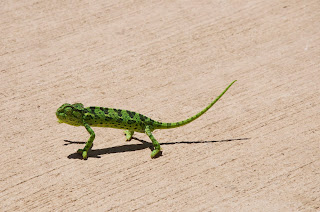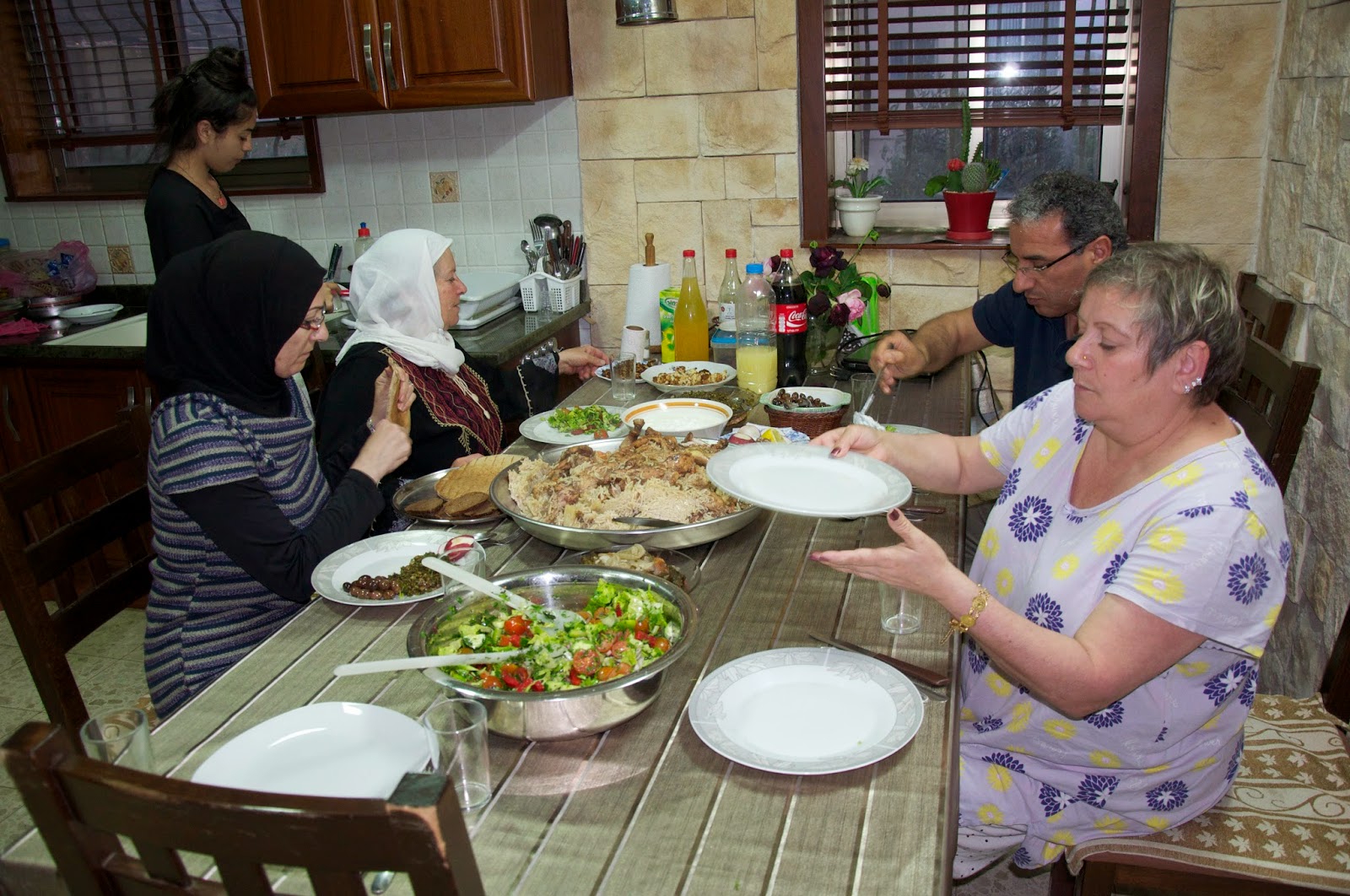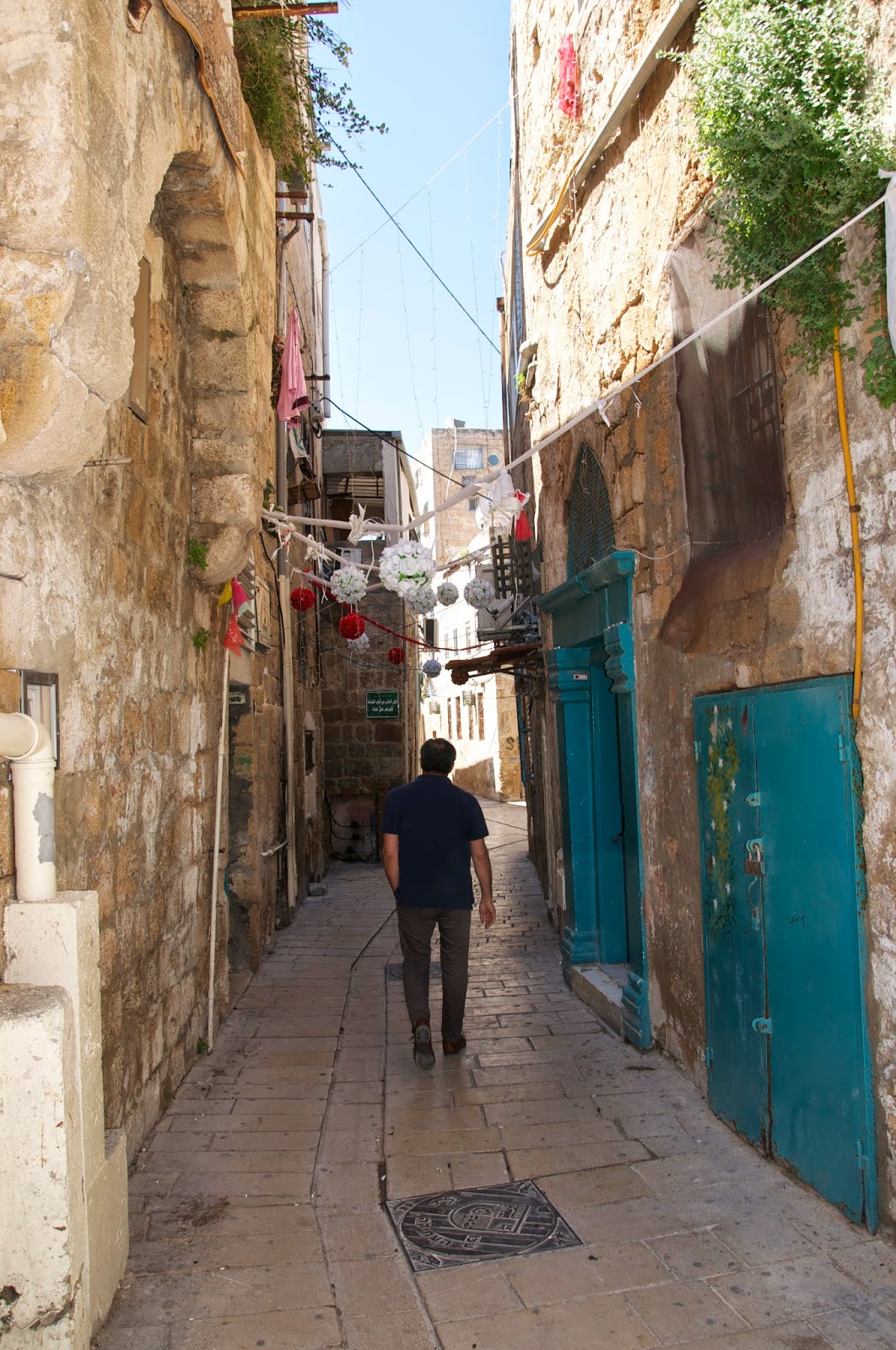I write "Artbus." "Art Bus" may be the correct form, but I run the words together because together they represent a dream, a concept, a brightly decorated vehicle and a Palestinian woman with a mission. That woman is Khitam Edelbi, pronounced khe (short e and a little slur at the back of your mouth) TOM ED-al-bee. She grew up in Acre, which is up the coast and since 1948 a part of Israel. She was the last of twelve children, six girls and six boys; surviving today are six women and five men. The women are Muheba, Naseba, Amira, Subheya, Zada and Khitam; the men, Mohamed, Khaled, Yousef, Umar and Wahib.
Khitam was an afterthought. Her mother and father certainly didn't need another child and hadn't expected one. Her father died when she was very young, her mother died a few years later. Her sister Zada raised her during her teen years with help from the siblings.
All her sisters are hajis; they have been to Mecca. All her sisters are covered but don't wear veils across their faces. All her sisters are mothers and widows. The family is large and close. All the brothers are fathers and all the siblings but Khaled live around Acre, now called "Acca." (I like the ancient name of the city Alexander the Great and the Crusaders laid siege to.) Khaled lives in Texas with his wife but he comes here every year for several weeks with the family.
Khitam went to high school in Haifa, a better school than was available to her in Acca, and then took two years of college, studying theater and art education. She acted with Hakawati Theatre in and worked with children in East Jerusalem. She was working with children and parents who had lost a brother or sister, a son or daughter in fighting with Israel when I heard about her. A mutual friend told me she wished I could meet her friend Khitam who was doing work in Palestine similar to the work we do at The Theater Project but in a very different setting. When I asked if she would like to come to Maine in the summer to participate in our summer program for kids, the world shifted on its axis just a teeny bit, not enough for anyone to notice.
Khitam came to Maine in the summer of 2001. I went to Logan Airport to pick her up, not really knowing what she looked like. She, however, had a photo I'd sent her so she recognized me when I arrived, late as usual. We drove back to Maine, where she now knows she has a second home, and we began a friendship that has continued and grown for fourteen years. She is my much younger Palestinian sister. After returning to Maine the next three summers and she decided to continue her education to get her BA. She applied to Lesley University in Cambridge, was accepted, managed to get enough financial support here and there to afford it and back she went to college! Winters were a bit of a shock to her, but she weathered them. Language was an issue. She was fluent in Arabic and Hebrew and her English was quite good when she arrived, but doing college work in English was a challenge, one she overcame. She studied on and got her BA.
Every summer she returned to Palestine to see her family and to do some work. At the end of every summer she had returned to Cambridge to work on her BA. She visited Maine often, even in winter when she declared Maine was FFF, the last word being "freezing." She adjusted and she wanted more, so she applied for Lesley's MA program in Creative Arts Therapy and was accepted. She got enough financial aid to continue and began her pursuit of a Masters degree. She did apprenticeships in a local high school program for troubled teens and in McLean Hospital. And soon she had an MA in Creative Arts Therapy. She also had a dream.
The dream was to drive an bus around Palestine, teaching art to children and teachers in villages where they could not afford an arts program in their small schools. The bus would be fitted with cupboards for art supplies and tables and chairs for children, with extra tables and chairs that could be placed outside when there were more children than the bus would hold. The bus would be painted with designs that appealed to children and would offer young children and teachers opportunities to make art. The bus would carry all necessary supplies.
Encouraged by many friends to pursue her dream, she began a campaign to raise money for a bus. She would need about $60,000, so it would take time, but she was determined and began her campaign. She spoke to groups in Massachusetts, Washington, D.C, Maine and California about her dream and asked for support. Slowly the money began to accumulate; a few thousand dollars from here, a few from there, eventually she had about $15,000 dollars in the bus bank account. Friends had helped her acquire non-profit status so donations in the States were tax deductible.
Then came the big leap, a miracle: a Palestinian bus company offered to donate a bus to her project, outfitted and painted the way she wanted it! A year later, the bus was ready. A local NGO that works with children and teachers became the agent for the bus, took care of it and hired a driver. They also funded much of the first year's work. Schools cannot afford to pay for the bus to come; that expense has to be funded from outside and it was! Khitam was on the road with the Artbus!
The first year, which was last year, she was in the north and south with the bus, usually four days a week. She worked on other projects one or two days a week. When the bus arrived in a village, children would run out to see it, just as she had dreamed. She and the teachers would set out the tables, prepare everything inside, and the children would get on the bus or sit at the tables outside, be given materials and they would make art. These were kindergarten children, and in many cases, this was the first time they had any materials for making art.
Now, a year later, Khitam continues to train teachers. So far she has trained over sixty teachers to use the bus on their own. She no longer travels four days a week with the bus. "I don't need to be there all the time. The teachers can learn to use the bus with their kids. The bus is for the kids and teachers, not for me. Now we need another bus. Too many schools ask for us; we can't get to all of them in a year." So she is thinking about another vehicle that can do the same work. An acquaintance who outfitted a truck to bring theater to villages wants to collaborate; he's not touring now. If she can get the truck outfitted for art and get funding for it, more small children can experience the joy of making art and maybe more schools will find ways…
Yesterday, Cotton and I went with Khitam to Khalil (Hebron) to see the bus in action. Khalil is a very busy city with streets that make Boston's inner city streets seem like highways, but more on Khalil in another blog. We eventually found the bus; Fayez, one of her collaborators from ECRC (Early Childhood Resource Center) who was there, gave her confused directions which she overcame, driving like a stunt driver in an action movie. And there it was, the Artbus, parked at the school! Teachers were ready to bring the kindergarten children on board.
Khitam introduced Cotton and me to Fayez, whom I had met a few years ago, and to some of the teachers. She got onboard, invited us up, and then checked with the teachers, helping to get materials ready for the kids. And then they came, beautiful five and six year-olds, eager to find out what they were going to do on this brightly painted bus parked at their school. For an hour or more, we watched one group after another enjoy making bracelets on the bus, then go to tables and chairs outside and make pictures, tables and chairs that came from the bus.
How did the world shift imperceptibly on its axis back in the summer of 2001? It jostled Khitam's imagination so she could soon dream of having a bus to drive around Palestine and do art with small children and their teachers. And that would remind me, a longtime dreamer, that dreams are good for us and that if we pursue them, they may become reality. It would also reconnect me with Palestine, where I had traveled decades ago but hadn't revisited since 1998. And Khitam? This summer she will visit the States, and while there, she will travel to communities where she first mentioned her dream and show people the results. She will also apply to Lesley University's Ph.D. program in Creative Arts Therapy.
That's how the world shifted. Photos are coming.















































